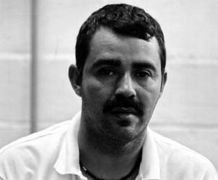Article published in the special Newsletter '15 years of PBI', October 2009
Vicente Vallies, volunteer from France (2001-9)
Throughout his long career as a human rights defender, Pablo Arenales has been a victim of threats and attacks on his life.
The day I met Pablo he was on his way home following a speaking tour in Spain; it was the end of 2001. He had left the region a few months previously, after having suffered an attack in 1999 and after the paramilitary takeover of Barrancabermeja, where he worked at the heart of the Regional Corporation for the Defence of Human Rights (CREDHOS), an organisation accompanied by PBI since its arrival in the country in 1994. I met with him having been given the difficult task of telling him that we were still debating in PBI whether we had the capacity to provide him with protection.
Today, eight years later, we meet again to talk about that time. Pablo Arenales joined CREDHOS in 1991. There were many years of harassment and threats and often the threaths were carried out, as shown by the assassinations of Blanca Cecilia Valero, Jahel Quiroga’s secretary, who was then the President of CREDHOS, Julio Cesar Berrio, member of CREDHOS and the failed attempt against Jorge Gómez Lizarazo, President of CREDHOS. All of the above were organised what came to be known as the 07 Navy intelligence network1 and, as a result, various members of CREDHOS were forcibly displaced or exiled in 1991 and 1992.
Pablo was injured in 1992 when he was participating in a verification commission for the massacre that took place in the Versalles neighbourhood in the north east area of Barrancabermeja. «The massacre happened on 10 June 1992 in a billiard hall; a group of hired assassins, hired by the 07 Navy network arrived on a bus. When they arrived they started to shoot, killing various people. The following day, 11 June, a verification mission was formed, made up of members of the Grassroots Coordination group (Coordinadora Popular) and CREDHOS. We went to the place where the massacre had taken place and then we went to the funeral parlours where people were mourning their dead to obtain information about what had happened and also to show our solidarity with the families of the victims. When the commission was about to leave, various armed men at the side of the road shot at us». Fortunately, they were unhurt, thanks to the driver who had not turned his engine off, «he drove off with the tyres blown. (...) He shot me here (pointing at his right shoulder). That day, after the scare, we went to the CREDHOS offices where we celebrated the fact we were still alive».
Given this situation, CREDHOS decided to request international accompaniment from PBI and the first team arrived in October 1994, in spite of the initial scepticism of the members of CREDHOS who were saying: «How will they protect us if they are not armed?» PBI gained the trust of the people. As Pablo says, «even though the threats, stigmatisation and accusations did not stop, there were fewer of them and the dissuasion worked».
In 1999, Pablo suffered a direct attempt on his life when he was waiting in a restaurant. «After all the threats we had experienced, we were always vigilant and aware of what was going on around us. On that day, after he heard the sudden braking of a motorbike, he turned round to look and saw the motorbike passenger turning round and taking a gun out».
Pablo hid behind the counter in a room and the hired assassin shouted «where is that son of a bitch, where is he?» However, as the element of surprise he was hoping for had been lost, he decided to leave. Pablo was able to call Jim from PBI who came to pick him up and he spent the night in the PBI house to ensure his protection.
What came to be known as the paramilitary takeover of Barrancabermeja took place on 23 December 2000. For Pablo, it was the result of a «long term process, like the drop of water that falls onto the rock until it breaks». Given the situation, various like-minded organisations recommended that Pablo leave the country and in order to carry on resisting he decided to carry out a three month speaking tour in Europe to raise awareness about the human rights and humanitarian crisis situation in the region and faced by the human rights organisations working there.
On his return, PBI decided to continue to accompany him until 2005 when he was forced to leave the country again following new threats. Today, Pablo continues to work as a human rights defender from Bogotá, with another organisation, Reiniciar that fights for the restoration of the memory of the Unión Patriótica genocide victims, demanding truth, justice and reparation and working to ensure that this type of crime is never committed again.
At the end of the interview, Pablo highlights the fact that «these last fifteen years should be seen as a homage to all the volunteers that have worked for PBI, those whose presence, accompaniment and national and international advocacy work, as well as their commitment to a more just society, have enabled human rights defenders in Colombia to continue to carry out our work in a repressive, violent and polarised context. To you and all of those who have gone before you, thank you very much and I hope that your work defending life and dignity continues».
1 Members of the Colombian state security forces, coordinated by the National Navy assassinated more than 130 social, grassroots leaders and human rights defenders in Barrancabermeja.
«Concerns about human rights defenders in Barrancaberjema», Colombia Campaign: We want them alive!, Amnesty International

